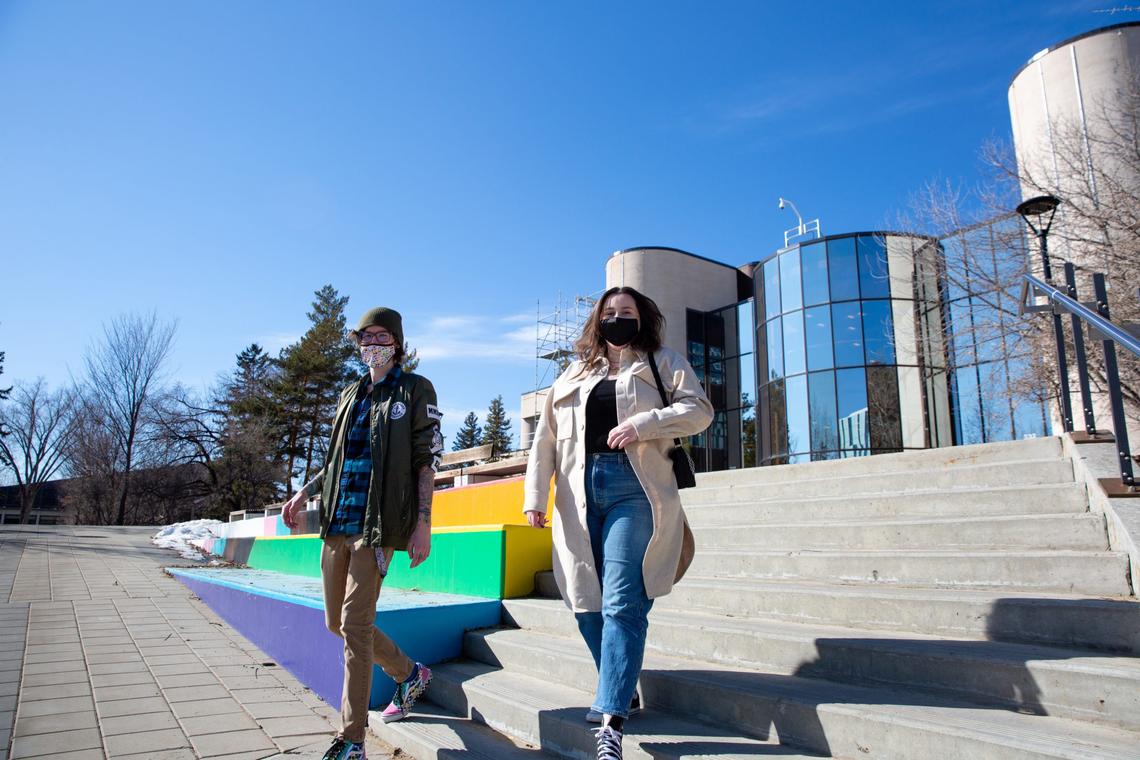March 30, 2021
How UCalgary is advancing Calgary’s economy, communities and health

What’s the benefit of a great research university? It’s a question you’ve likely not asked yourself lately — or at all. But as the University of Calgary focuses on growth in the years ahead, it’s a question that’s preoccupied me.
An obvious answer is the impact we have in the lives of our more than 35,000 students: their learning experience while they are a student, and how that learning affects their life as one of our alumni. Another answer is UCalgary’s annual economic impact. And our footprint is, as you’d expect for the city’s second-largest employer, large: a $16.5 billion impact, to be precise, which supports almost 22,500 jobs.
- Brent Edwards, an associate professor in kinesiology, and postdoctoral scholar Ifaz Haider perform a fatigue test on a bone sample to better understand a rare fracture found in people with osteoporosis.
But neither of these captures a research university’s broader benefit, which has an economic aspect of its own. As we’ve seen in cities like Pittsburgh and Houston, the new technologies and new businesses that flow from research universities can be transformative.
And UCalgary is well underway in this field, with an innovation ecosystem that over the last 30 years has more than 2,200 separate inventions. Our new UCeed program will help start-ups flourish and grow, and our Life Sciences Innovation Hub, currently home to more than 20 commercial tenants, created more than 240 jobs in 2019.
We’re also training the professionals our economy and community will need. As the new cancer centre is being built, some doctors and nurses who will work there are currently learning at UCalgary. Our city’s growing technology sector will hire current UCalgary students, whose skills will help it grow further.
Another core benefit is perhaps obvious. Great research universities are home to some very smart people who can help the community through some very hard times. Almost a year ago, when COVID-19 became the thing we’ve come to know so well, UCalgary assembled a panel of health and data experts to advise the City of Calgary.
We built a data tracker to help municipal officials know what the impact of policy decisions would be. As Mayor Nenshi said, the only way to overcome the pandemic is to follow evidence-based decision making. UCalgary agreed — and built a data tracker to help the city respond to the pandemic. As we also see in areas from stroke and suicide prevention to our work to reduce concussions, we help make Calgary healthier. And our entrepreneurial thinking will continue to help create the future of health.

UCalgary students walk outside the MacEwan Student Centre on the university’s main campus.
SUPPLIED
Our partnership with the city also extends beyond health. Through the Urban Alliance, we’re working on everything from housing to recycling to making the Deerfoot move better. And in we’re helping animate a nine-block radius around city hall, making it safer and more inviting. By helping build people-centred cities, we’re improving communities across Calgary and working to address some of our city’s most pressing problems.
It wouldn’t be Calgary without mentioning energy, and UCalgary’s leading research on the energy transformation will help us keep the title of energy capital well into the future. There are more than 300 UCalgary faculty in a range of disciplines — engineering, chemistry, geology, law and more — working on today’s energy needs, from inventing pipelines that don’t leak, to reducing emissions and creating a more sustainable future.
Indeed, we’re not only working to reduce emissions. We’re also working to capture and store them. Thanks to UCalgary’s collaboration with partners, there’s a carbon storage facility near Brooks that is unlike none other in the world. For it does not only store the carbon, it actively monitors it underground to ensure it doesn’t bubble up to the surface.
We’re also advancing digital frontiers through an exciting international team — interstellar, to be precise, considering NASA also belongs — to create a quantum internet. What you’re about to read isn’t a typo or a fantasy. A quantum internet will allow vast quantities of data to be teleported, with major implications for data storage and security.
I don’t know if thousands of Calgarians will one day work in the quantum internet, but I will wager that thousands will work in a company or on a new technology birthed by UCalgary. I know UCalgary will make thousands of Calgarians healthier, and their quality of life in communities across the city will improve.
Few institutions have the potential for such-wide ranging and diverse impact as a great research university. It is the nexus for issues that affect our daily life today — and which will tomorrow. Every day, the faculty and staff at UCalgary use their entrepreneurial thinking to do exactly that and improve the community we’re proud to call home.
Ed McCauley is president of the University of Calgary.
This story was provided by University of Calgary for commercial purposes.
